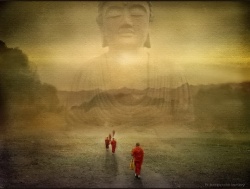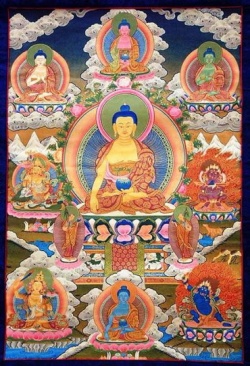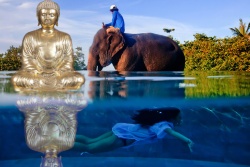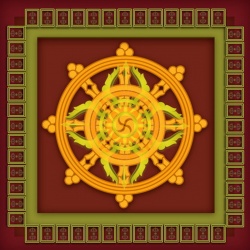This World And Other Worlds
Realms of Existence
The Origin of the World
'There is no reason to suppose that the world had a beginning at all. The idea that things must have a beginning is really due to the poverty of our thoughts.'(Bertrand Russell)
There are three schools of thought regarding the origin of the world. The first school of thought claims that this world came into existence by nature and that nature is not an intelligent force. However, nature works no its own accord and goes on changing.
The second school of thought says that the world was created by an almighty God who is responsible for everything.
The third school of thought says that the beginning of this world and of life is inconceivable since they have neither beginning nor end. Buddhism is in accordance with this third school of thought. Bertrand Russell supports this school of thought by saying, 'There is no reason to suppose that the world had a beginning at all. The idea that things must have a beginning is really due to the poverty of our thoughts.'
Modern science says that some millions of years ago, the newly cooled earth was lifeless and that life originated in the ocean. Buddhism never claimed that the world, sun, moon, stars, wind, water, days and nights were created by a powerful god or by a Buddha. Buddhists believe that the world was not created once upon a time, but that the world has been created millions of times every second and will continue to do so by itself and will break away by itself. According to Buddhism, world systems always appear and disappear in the universe.
H.G. Wells, in A Short History of the World,says 'It is universally recognized that the universe in which we live, has to all appearance, existed for an enormous period of time and possibly for endless time. But that the universe in which we live, has existed only for six or seven thousand years may be regarded as an altogether exploded idea. No life seems to have happened suddenly upon earth.'
The efforts made by many religions to explain the beginning and the end of the universe are indeed ill-conceived. The position of religions which propound the view that the universe was created by god in an exactly fixed year, has become a difficult one to maintain in the light of modern and scientific knowledge.
Today scientists, historians, astronomers, biologists, botanists, anthropologists and great thinkers have all contributed vast new knowledge about the origin of the world. This latest discovery and knowledge is not at all contradictory to the Teachings of the Buddha. Bertrand Russell again says that he respects the Buddha for not making false statements like others who committed themselves regarding the origin of the world.
The speculative explanations of the origin of the universe that are presented by various religions are not acceptable to the modern scientists and intellectuals. Even the commentaries of the Buddhist Scriptures, written by certain Buddhist writers, cannot be challenged by scientific thinking in regard to this question. The Buddha did not waste His time on this issue. The reason for His silence was that this issue has no religious value for gaining spiritual wisdom. The explanation of the origin of the universe is not the concern of religion. Such theorizing is not necessary for living a righteous way of life and for shaping our future life. However, if one insists on studying this subject, then one must investigate the sciences, astronomy, geology, biology and anthropology. These sciences can offer more reliable and tested information on this subject than can be supplied by any religion. The purpose of a religion is to cultivate the life here in this world and hereafter until liberation is gained.
In the eyes of the Buddha, the world is nothing but Samsara--the cycle of repeated births and deaths. To Him, the beginning of the world and the end of the world is within this Samsara. Since elements and energies are relative and inter-dependent, it is meaningless to single out anything as the beginning. Whatever speculation we make regarding the origin of the world, there is no absolute truth in our notion.
'Infinite is the sky, infinite is the number of beings,
Infinite are the worlds in the vast universe,
Infinite in wisdom the Buddha teaches these,
Infinite are the virtues of Him who teaches these.'
(Sri Ramachandra)
One day a man called Malunkyaputta approached the Master and demanded that He explain the origin of the Universe to him. He even threatened to cease to be His follow if the Buddha's answer was not satisfactory. The Buddha calmly retorted that it was of no consequence to Him whether or not Malunkyaputta followed Him, because the Truth did not need anyone's support. Then the Buddha said that He would not go into a discussion of the origin of the Universe. To Him, gaining knowledge about such matters was a waste of time because a man's task was to liberate himself from the present, not the past or the future. To illustrate this, the Enlightened One related the parable of a man who was shot by a poisoned arrow. This foolish man refused to have the arrow removed until he found out all about the person who shot the arrow. By the time his attendants discovered these unnecessary details, the man was dead. Similarly, our immediate task is to attain Nibbana, not to worry about our beginnings.
Buddha was just not interested in discussion about retrospect knowledge but was more concern with the introspect insight of a person.
quote:-
I have heard that on one occasion the Blessed One was staying in Savatthi, at Jeta's Grove, Anathapindika's monastery. Then the wanderer Vacchagotta went to the Blessed One and, on arrival, exchanged courteous greetings with him. After an exchange of friendly greetings & courtesies, he sat to one side. As he was sitting there he asked the Blessed One:
Vaccha: "How is it, Master Gotama, does Master Gotama hold the view: 'The cosmos is eternal: only this is true, anything otherwise is worthless'?"
Buddha: "...no..."
...
V: "Then does Master Gotama hold the view: 'The cosmos is not eternal: only this is true, anything otherwise is worthless'?"
B: "...no..."
V: "Then does Master Gotama hold the view: 'The cosmos is finite: only this is true, anything otherwise is worthless'?"
B: "...no..."
V: "Then does Master Gotama hold the view: 'The cosmos is infinite: only this is true, anything otherwise is worthless'?"
B: "...no..."
And also
V: "Does Master Gotama have any position at all?"
B: "A 'position,' Vaccha, is something that a Tathagata has done away with. What a Tathagata sees is this: 'Such is form, such its origin, such its disappearance; such is feeling, such its origin, such its disappearance; such is perception... such are mental fabrications... such is consciousness, such its origin, such its disappearance.' Because of this, I say, a Tathagata — with the ending, fading out, cessation, renunciation, & relinquishment of all construings, all excogitations, all I-making & mine-making & obsession with conceit — is, through lack of clinging/sustenance, released."
V: "But, Master Gotama, the monk whose mind is thus released: Where does he reappear?"
B: "'Reappear,' Vaccha, doesn't apply."
V: "In that case, Master Gotama, he does not reappear."
B: "'Does not reappear,' Vaccha, doesn't apply."
V: "...both does & does not reappear."
B: "...doesn't apply."
V: "...neither does nor does not reappear."
B: "...doesn't apply."
V: "How is it, Master Gotama, when Master Gotama is asked if the monk reappears... does not reappear... both does & does not reappear... neither does nor does not reappear, he says, '...doesn't apply' in each case. At this point, Master Gotama, I am befuddled; at this point, confused. The modicum of clarity coming to me from your earlier conversation is now obscured."
B: "Of course you're befuddled, Vaccha. Of course you're confused. Deep, Vaccha, is this phenomenon, hard to see, hard to realize, tranquil, refined, beyond the scope of conjecture, subtle, to-be-experienced by the wise. For those with other views, other practices, other satisfactions, other aims, other teachers, it is difficult to know. That being the case, I will now put some questions to you. Answer as you see fit. What do you think, Vaccha: If a fire were burning in front of you, would you know that, 'This fire is burning in front of me'?"
One day a man called Malunkyaputta approached the Master and demanded that He explain the origin of the Universe to him. He even threatened to cease to be His follow if the Buddha's answer was not satisfactory. The Buddha calmly retorted that it was of no consequence to Him whether or not Malunkyaputta followed Him, because the Truth did not need anyone's support. Then the Buddha said that He would not go into a discussion of the origin of the Universe. To Him, gaining knowledge about such matters was a waste of time because a man's task was to liberate himself from the present, not the past or the future. To illustrate this, the Enlightened One related the parable of a man who was shot by a poisoned arrow. This foolish man refused to have the arrow removed until he found out all about the person who shot the arrow. By the time his attendants discovered these unnecessary details, the man was dead. Similarly, our immediate task is to attain Nibbana, not to worry about our beginnings.
The world (everything) arises and ends within our mind and body. Where else could anything be if not within our senses. All worlds, realms, devas, spirits and experiences have to be made available to the senses. No senses, no world.
Dwelling at Savatthi. There the Blessed One addressed the monks: "I will teach you the origination of the world & the ending of the world. Listen & pay close attention. I will speak."
"As you say, lord," the monks responded to the Blessed One.
The Blessed One said: "And what is the origination of the world? Dependent on the eye & forms there arises eye-consciousness. The meeting of the three is contact. From contact as a requisite condition comes feeling. From feeling as a requisite condition comes craving. From craving as a requisite condition comes clinging/sustenance. From clinging/sustenance as a requisite condition comes becoming. From becoming as a requisite condition comes birth. From birth as a requisite condition, then aging & death, sorrow, lamentation, pain, distress, & despair come into play. This is the origination of the world.
"Dependent on the ear & sounds there arises ear-consciousness. The meeting of the three is contact... Dependent on the nose & aromas there arises nose-consciousness. The meeting of the three is contact... Dependent on the tongue & flavors there arises tongue-consciousness. The meeting of the three is contact... Dependent on the body & tactile sensations there arises body-consciousness. The meeting of the three is contact... Dependent on the intellect & mental qualities there arises intellect-consciousness. The meeting of the three is contact. From contact as a requisite condition comes feeling. From feeling as a requisite condition comes craving. From craving as a requisite condition comes clinging/sustenance. From clinging/sustenance as a requisite condition comes becoming. From becoming as a requisite condition comes birth. From birth as a requisite condition, then aging & death, sorrow, lamentation, pain, distress, & despair come into play. This is the origination of the world.
"And what is the ending of the world? Dependent on the eye & forms there arises eye-consciousness. The meeting of the three is contact. From contact as a requisite condition comes feeling. From feeling as a requisite condition comes craving. Now, from the remainderless cessation & fading away of that very craving comes the cessation of clinging/sustenance. From the cessation of clinging/sustenance comes the cessation of becoming. From the cessation of becoming comes the cessation of birth. From the cessation of birth, then aging & death, sorrow, lamentation, pain, distress, & despair all cease. Such is the cessation of this entire mass of stress & suffering. This is the ending of the world.
"Dependent on the ear & sounds there arises ear-consciousness. The meeting of the three is contact... Dependent on the nose & aromas there arises nose-consciousness. The meeting of the three is contact... Dependent on the tongue & flavors there arises tongue-consciousness. The meeting of the three is contact... Dependent on the body & tactile sensations there arises body-consciousness. The meeting of the three is contact... Dependent on the intellect & mental qualities there arises intellect-consciousness. The meeting of the three is contact. From contact as a requisite condition comes feeling. From feeling as a requisite condition comes craving. Now, from the remainderless cessation & fading away of that very craving comes the cessation of clinging/sustenance. From the cessation of clinging/sustenance comes the cessation of becoming. From the cessation of becoming comes the cessation of birth. From the cessation of birth, then aging & death, sorrow, lamentation, pain, distress, & despair all cease. Such is the cessation of this entire mass of stress & suffering. This is the ending of the world."





